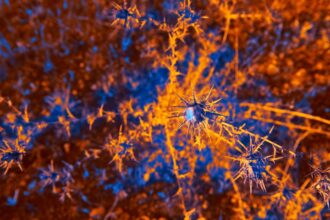Depersonalization and derealization are psychological phenomena that can leave you feeling detached from your own thoughts, feelings, or sense of self. When you experience depersonalization, you might feel as though you are an outside observer of your own life, as if you are watching yourself in a movie. This sensation can be disorienting and unsettling, leading to a profound sense of alienation from your own identity.
On the other hand, derealization involves a sense of detachment from your surroundings. You may perceive the world around you as unreal or distorted, as if you are living in a dream or a fog. Both experiences can occur simultaneously and are often linked to stress, anxiety, or trauma.
These phenomena are not uncommon; many people may experience fleeting moments of depersonalization or derealization during times of extreme stress or fatigue. However, when these feelings become persistent or recurrent, they can significantly impact your quality of life. Understanding these experiences is crucial for recognizing their effects and seeking appropriate help.
The sensations can be alarming, but they are often symptoms of underlying issues that can be addressed with the right support and treatment.
Key Takeaways
- Depersonalization and derealization are dissociative disorders that involve feeling disconnected from oneself and the world around them.
- Symptoms of depersonalization include feeling like an outside observer of one’s thoughts and actions, while derealization involves feeling like the world is unreal or distorted.
- Causes and triggers of depersonalization and derealization can include trauma, anxiety, stress, substance abuse, and certain mental health conditions.
- Depersonalization and derealization are often linked to anxiety and trauma, and can exacerbate symptoms of these conditions.
- The impact of depersonalization and derealization on daily life can be significant, affecting relationships, work, and overall quality of life.
Recognizing the Symptoms
Recognizing the symptoms of depersonalization and derealization is the first step toward understanding what you might be experiencing. You may find yourself questioning your reality, feeling disconnected from your body, or perceiving your environment as strange or unfamiliar. Common symptoms include a sense of emotional numbness, difficulty concentrating, and a feeling of being detached from your thoughts or actions.
You might also notice that familiar places seem foreign or that people you know appear distant or unrecognizable. These symptoms can vary in intensity and duration. Some individuals may experience brief episodes that last only a few minutes, while others may endure prolonged periods of these sensations.
It’s essential to pay attention to how these feelings affect your daily life. If you find that they interfere with your ability to function at work, maintain relationships, or engage in activities you once enjoyed, it may be time to seek further understanding and support.
Causes and Triggers

The causes and triggers of depersonalization and derealization can be complex and multifaceted. Often, these experiences arise in response to overwhelming stress or trauma.
Additionally, substance use—particularly hallucinogens or high doses of marijuana—can lead to episodes of depersonalization and derealization. Understanding your personal triggers is vital for managing these experiences effectively. Moreover, certain mental health conditions can predispose you to these sensations.
Anxiety disorders, depression, and post-traumatic stress disorder (PTSD) are commonly associated with depersonalization and derealization. If you have a history of anxiety or trauma, you may be more susceptible to experiencing these feelings during particularly stressful times. Identifying the specific factors that contribute to your experiences can empower you to take proactive steps toward managing them.
The Connection to Anxiety and Trauma
| Connection to Anxiety and Trauma | Statistics |
|---|---|
| Percentage of individuals with anxiety disorders who have experienced trauma | 60% |
| Number of people in the US who experience trauma each year | Over 10 million |
| Percentage of PTSD cases that are linked to traumatic events | Around 80% |
| Percentage of individuals with PTSD who also have anxiety disorders | Over 50% |
The connection between depersonalization, derealization, anxiety, and trauma is significant and often intertwined. When faced with overwhelming stressors or traumatic events, your mind may employ depersonalization as a coping mechanism. This dissociative response allows you to distance yourself from the emotional pain associated with the experience.
While this can provide temporary relief, it can also lead to persistent feelings of disconnection if the underlying issues remain unaddressed. Anxiety plays a crucial role in this dynamic as well. High levels of anxiety can exacerbate feelings of depersonalization and derealization, creating a vicious cycle where anxiety leads to dissociation, which in turn heightens anxiety levels.
Recognizing this connection is essential for breaking the cycle. By addressing the root causes of your anxiety and trauma through therapy or other interventions, you can begin to reduce the frequency and intensity of these dissociative experiences.
Impact on Daily Life
The impact of depersonalization and derealization on daily life can be profound and far-reaching. You may find it challenging to engage fully in social situations or work responsibilities due to feelings of disconnection from yourself and your surroundings. This detachment can lead to difficulties in forming relationships, as you might struggle to connect with others on an emotional level.
Additionally, the constant questioning of reality can create a sense of isolation, making it hard for you to share your experiences with friends or family. Moreover, these sensations can affect your overall mental health and well-being. The persistent feeling of being disconnected from reality can lead to increased anxiety and depression over time.
You may feel trapped in a cycle where the very symptoms meant to protect you from emotional pain become sources of distress themselves. Acknowledging how these experiences impact your daily life is crucial for seeking help and finding effective coping strategies.
Diagnosing Depersonalization and Derealization

Diagnosing depersonalization and derealization typically involves a comprehensive evaluation by a mental health professional. During this process, the clinician will assess your symptoms, medical history, and any potential underlying conditions that may contribute to your experiences. It’s essential to provide detailed information about the frequency and duration of your symptoms, as well as any triggers you have identified.
In some cases, clinicians may use standardized questionnaires or diagnostic criteria outlined in the Diagnostic and Statistical Manual of Mental Disorders (DSM-5) to aid in diagnosis. This thorough approach ensures that any co-occurring mental health conditions are also considered, allowing for a more accurate understanding of your situation. If you suspect that you are experiencing depersonalization or derealization, seeking a professional evaluation is an important step toward finding clarity and support.
Treatment Options
Treatment options for depersonalization and derealization vary depending on individual needs and circumstances. Psychotherapy is often considered one of the most effective approaches for addressing these experiences. Cognitive-behavioral therapy (CBT) can help you identify negative thought patterns associated with dissociation and develop healthier coping strategies.
Additionally, trauma-focused therapies may be beneficial if your symptoms are linked to past traumatic experiences. Medication may also play a role in treatment for some individuals. While there are no specific medications approved solely for depersonalization or derealization, antidepressants or anti-anxiety medications may help alleviate associated symptoms if prescribed by a qualified professional.
It’s essential to work closely with your healthcare provider to determine the best course of action tailored to your unique situation.
Coping Strategies
In addition to professional treatment options, there are several coping strategies you can implement in your daily life to manage feelings of depersonalization and derealization. Mindfulness practices such as meditation or deep breathing exercises can help ground you in the present moment, reducing feelings of disconnection. Engaging in physical activities like yoga or walking can also promote a sense of connection between your mind and body.
Keeping a journal can be another effective tool for processing your thoughts and emotions related to these experiences. Writing about your feelings can provide clarity and help you identify patterns or triggers over time. Additionally, establishing a strong support network—whether through friends, family, or support groups—can offer comfort and understanding as you navigate these challenges.
Seeking Professional Help
If you find that depersonalization and derealization are significantly impacting your life, seeking professional help is crucial. A mental health professional can provide guidance tailored to your specific needs and help you explore effective treatment options. It’s important to remember that reaching out for help is a sign of strength; acknowledging that you need support is the first step toward healing.
When seeking professional help, consider looking for therapists who specialize in dissociative disorders or trauma-related issues. They will have the expertise necessary to guide you through the complexities of your experiences while providing a safe space for exploration and healing.
Support for Loved Ones
Supporting someone who is experiencing depersonalization or derealization can be challenging but incredibly important. If someone close to you is struggling with these sensations, it’s essential to approach them with empathy and understanding. Encourage open communication about their experiences without judgment; sometimes just having someone listen can make a significant difference.
Educating yourself about depersonalization and derealization can also help you provide better support. Understanding what they are going through will enable you to offer reassurance during difficult moments while encouraging them to seek professional help if needed. Your presence and support can be invaluable as they navigate their journey toward recovery.
Finding Hope and Recovery
Finding hope and recovery from depersonalization and derealization is possible with the right support and strategies in place. Many individuals who have experienced these sensations have successfully managed their symptoms through therapy, coping techniques, and lifestyle changes.
Cultivating a sense of hope involves recognizing small victories in your journey toward healing—whether it’s learning new coping strategies or finding moments of connection with yourself or others. Surrounding yourself with supportive individuals who understand what you’re going through can also foster resilience as you work toward reclaiming your sense of self and reality. In conclusion, while depersonalization and derealization can be distressing experiences that impact various aspects of life, understanding their nature is the first step toward healing.
By recognizing symptoms, identifying triggers, seeking professional help, and implementing coping strategies, you can navigate this journey with hope for recovery ahead.
In exploring the complexities of depersonalization and derealization symptoms, it’s essential to consider various therapeutic approaches and personal experiences that can provide insight into these conditions. An article on Unplugged Psych delves into the nuances of these symptoms, offering a comprehensive overview of potential causes and coping strategies. This resource is invaluable for those seeking to understand the psychological underpinnings of these experiences and how they can impact daily life. By examining such articles, individuals can gain a deeper understanding of their own experiences or those of others, fostering empathy and awareness.
LEARN MORE About Unmasking the Mysteries Behind Depersonalization and Derealization
FAQs
What are depersonalization and derealization symptoms?
Depersonalization and derealization are dissociative symptoms that involve feeling disconnected from oneself or one’s surroundings. Depersonalization involves feeling detached from one’s own thoughts, feelings, or body, while derealization involves feeling detached from the external world, such as feeling like things are unreal or distorted.
What are the common causes of depersonalization and derealization symptoms?
Depersonalization and derealization symptoms can be caused by various factors, including stress, trauma, anxiety, depression, substance abuse, and certain mental health disorders such as dissociative disorders and post-traumatic stress disorder (PTSD).
What are the potential risk factors for developing depersonalization and derealization symptoms?
Some potential risk factors for developing depersonalization and derealization symptoms include experiencing trauma or abuse, having a history of anxiety or depression, using certain drugs or medications, and experiencing high levels of stress.
How are depersonalization and derealization symptoms diagnosed?
Depersonalization and derealization symptoms are typically diagnosed through a thorough evaluation by a mental health professional, which may include a physical exam, psychological assessment, and discussion of symptoms and experiences.
What are the treatment options for depersonalization and derealization symptoms?
Treatment for depersonalization and derealization symptoms may include therapy (such as cognitive-behavioral therapy or dialectical behavior therapy), medication (such as antidepressants or anti-anxiety medications), stress management techniques, and addressing any underlying mental health conditions.
Can depersonalization and derealization symptoms be managed or cured?
While there is no specific cure for depersonalization and derealization symptoms, many individuals are able to manage and reduce their symptoms through a combination of therapy, medication, stress management, and addressing any underlying mental health conditions. It is important to seek professional help for an accurate diagnosis and appropriate treatment plan.




